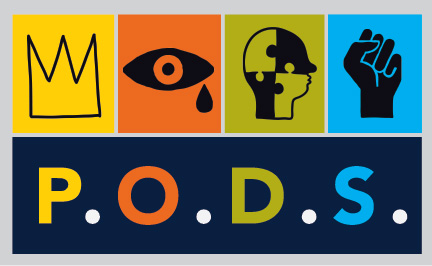
Margo Dalal, MSW '18 shares her story as a co-founder and executive director of the Detroit Community Wealth Fund
Watch the video.
Management & Leadership
In the Management and Leadership Pathway, students learn how to effectively manage and lead programs and organizations within a framework of social work values and ethics. This pathway provides students with the skills and knowledge to manage high-impact philanthropic organizations through leadership theory, program planning, fiscal management, fundraising and organizational strategy.
Careers
This pathway prepares to lead and manage organizations in the philanthropic sector. Job growth for leadership positions in nonprofit or philanthropic organizations is projected to grow 8 percent by 2025.
Careers include:
- Assistant Director
- Development Associate
- Education and Training Coordinator
- Events Coordinator
- Grant Writer/Manager
- Manager of Quality Improvement
- Program Director
- Project Manager
- Volunteer Coordinator
Field Placements
In the MSW program, some of the most important learning occurs outside of the classroom. Field placement is a supervised internship at a social services organization and provides the hands-on, real-world training portion of the curriculum.
Field placements might include:
- Community Support Programs
- Higher Education
- Schools
- Government agencies
- Professional associations
- Behavioral health centers
- Hospitals
- Advocacy programs
- Cooperatives and collectives
Program Details
Management and Leadership Pathway Course Requirements
Essentials
- SW505: Engaging Social Justice, Diversity, and Oppression in Social Work, 3 credits
- SW506: Essentials of Interpersonal Practice, 4 credits
- SW507: Research Basics for Social Work Practice, 1 credits
- SW508: Essentials of Social Welfare Policy, 3 credits
- SW509: Essentials of Community and Organizational Practice, 3 credits
- SW590: Introduction to Social Work Practice, 1 credits
- SW649: Practicing Policy with Current Events, 1 credits
- SW678: Program Evaluation and Applied Research, 3 credits
- SW699: Social Work Capstone, 1 credits
Pathway Requirement
- SW662: Frameworks for Understanding Social Impact Organizations, 3 credits
- SW665: Social Impact Leadership and Governance, 3 credits
Pathway Requirement (choose one)
- SW660: Project and Program Design and Implementation, 3 credits
- SW661: Budgeting and Fiscal Management, 3 credits
- SW663: Fundraising and Grant Writing, 3 credits
- SW664: Human Resource Development and Management, 3 credits
Please see course planning worksheets for a full list of courses associated with this pathway.
Competencies for Management and Leadership
University of Michigan's School of Social Work (U-M SSW) is accredited by the Commission on Accreditation (COA), of the Council on Social Work Education (CSWE). Accreditation is a system of recognizing educational programs as having a level of performance and quality that gain them the confidence of the educational community and the public. You can read more about the Educational Policy and Accreditation Standards here.
At U-M SSW, each pathway has specialized competencies that describe the knowledge, values, skills, and cognitive and affective processes that comprise the competency in each pathway area.
1. Demonstrate Ethical and Professional Behavior
Social workers demonstrate the ability to apply ethical social work principles and critical thinking to products and work produced. Social workers understand the role of emotional intelligence and professional resilience in professional and ethical practice. Social workers understand the role of other professionals when engaged in interprofessional teams within their areas of specialization. Social workers recognize the importance of life-long learning and ways that supervision and consultation can support continued development.
Practice Behaviors:
- Utilize supervision and consultation to guide professional decision-making.
- Demonstrate emotional intelligence in practice and professional situations.
- Utilize effective communication strategies appropriate to context.
2. Engage Diversity and Difference in Practice
Management and Leadership Pathway students work with and on behalf of people experiencing marginalization to change oppressive organizational practices, community conditions and social policies to promote social change. Social workers understand the ways in which oppression and inequity impact marginalized populations in social impact organizations and systems of care, communities and cities, and in social policies that affect them.
Practice Behaviors:
- Formulate inclusive engagement strategies based on an intersectional analysis of systems of power, privilege, and oppression both within and outside organizational, community, and policy contexts.
- Create a climate of inclusion that builds on the strengths of diverse stakeholders, integrates diverse points of view, and facilitates full engagement in ways that embrace the cultural and spiritual histories of people.
- Mediate tensions and conflicts that arise from managing cultural, political, and social differences between and within diverse groups.
3. Advance Human Rights and Social, Economic, and Environmental Justice
Social workers advance human rights and social, economic, and environmental justice within and outside their organizations. Social workers recognize historical legacies of oppression and discrimination and challenge policies and practices that tolerate or promote racism, sexism, heterosexism, and other discriminatory treatments of people based on identities. Social workers design and advance organizational and public policies informed by the Universal Declaration of Human Rights, which guarantees all people the right to work, housing, healthcare, education, leisure, privacy, economic security, and a clean, safe, and sustainable organizational and social environment.
Practice Behaviors:
- Engage organizational and external stakeholders to design and promote programs and services that address human rights to access resources that ensure social, economic, and environmental equity
- Identify issues, develop strategies, evaluate outcomes, and promote human rights and social justice with affected internal and external constituencies
- Engage key stakeholders to advocate for access to resources, services, benefits, and opportunities for vulnerable and marginalized clients, constituencies, and communities.
4. Engage in Practice-informed Research and Research-informed Practice
Social workers use a wide range of research methods to recognize how social, cultural, economic, political, historical, and organizational factors influence social workers’ practices and experiences of people experiencing marginalization and exclusion. Social workers use research findings to inform the development of policies and programs, to translate evidence to practice, and to critically evaluate current social work practice. Social workers understand how to identify and apply relevant evidence-informed practices and organizational theories that guide their engagement practices as social work managers and leaders.
Practice Behaviors:
- Engage in critical analysis and ongoing review of research findings, macro practice models, and practice wisdom to inform organizational, community, and policy practice.
- Identify, critically evaluate, and use data and scholarship to inform the development, implementation, and evaluation of policies and programs.
- Identify anticipated obstacles and opposition to conduct and disseminate research, including ethical, political, and economic dilemmas.
5. Engage in Policy Practice
Social workers understand how to analyze, formulate, and advocate for policies that advance human rights and social, economic, and/or environmental justice through the application of critical thinking skills. Social workers are able to identify how current events are linked to policy issues, how to critically analyze and understand policy implications, and apply strategies to engage in policy practice that effect change and advocate for clients.
Practice Behaviors:
- Identify how current events are linked to policy issues impacting clients and client systems.
- Analyze the implications of policy across service systems.
- Identify strategies to engage with policy to advocate for clients and client systems.
6. Engage with Individuals, Families, Groups, Organizations, and Communities
Social workers identify concerns and preferences, develop plans, and address problems through engagement with diverse stakeholders. Students acknowledge the role of intersectional identity and diverse stakeholder groups, and the impact of this diversity in the development and implementation of organizational governance and strategy.
Practice Behaviors:
- Develop and implement multiple engagement strategies that reflect an understanding of structural, environmental, and power dynamics; policymakers’ characteristics and objectives; and the strengths, priorities, and interests of stakeholder groups.
- Demonstrate effective group facilitation and mediation skills to promote dialogue and collaborative processes.
- Develop their own leadership skills and those of constituent groups to initiate and facilitate dialogue that mobilizes and sustains action.
- Use multiple digital, written, and verbal communication skills to engage different constituencies, partners, and target audiences.
7. Assess Individuals, Families, Groups, Organizations, and Communities
Social workers use theories, frameworks, and evidence to understand practices and behaviors of individuals, families, groups, organizations, and communities.
Practice Behaviors:
- Assess and analyze assets, needs, benefits, gaps in services, rights, and the distribution of resources and power to implement equitable and inclusive macro interventions.
- Prepare reports that summarize and analyze collected data and frame options for intervention.
- Design and conduct assessments of the structure, composition, process, and environmental factors that affect organizational performance as well as community and policy practice activities.
8. Intervene with Individuals, Families, Groups, Organizations, and Communities
Social workers work to ensure that interventions combat systemic oppression and injustice that permeate our organizations and society and that often become institutionalized through social policies. Social workers use professional knowledge to apply evidence-informed interventions at individual, group, organizational, local, state, and national levels. They build power and capacity for positive social change by effectively managing human service organizations and delivery systems, and shaping organizational and social policies.
Practice Behaviors:
- Negotiate, mediate, and advocate with and on behalf of diverse clients and constituencies and facilitate their participation in interventions at the interpersonal, organizational, community and societal levels.
- Initiate and facilitate interprofessional collaborations within and between organizational, community, and policy partners to achieve positive system change.
- Design and formulate informational materials, deliver persuasive arguments through multimedia communications.
9. Evaluate Practice with Individuals, Families, Groups, Organizations, and Communities
Social workers consider research and theories on organizational, community, and political processes in addressing the causes and consequences of social problems, inequality, and systematic oppression. Social workers ensure that evaluation findings are used to promote social, political, and economic justice, and sustainable and inclusive services, programs, and organizations. Social workers strive to include the perspectives, input, and participation of stakeholders and community members throughout the evaluation process.
Practice Behaviors:
- Integrate theoretical and conceptual frameworks into evaluation strategies that facilitate an understanding of community, organizational, and policy dynamics and outcomes
- Use and translate evaluation outcomes to increase the effectiveness and sustainability of organizations and communities and to advocate for policies and planned change efforts that advance social work values.
The graduate courses listed below have been taken by previous MSW students or have been identified as being of possible interest to students in this pathway and can be taken to fulfill Pathway Required Electives. On the course planning worksheet, information regarding Pathway Required Electives is included.
There are many other courses not listed below that may be of interest and may also meet the elective requirement. If you identify a pathway-related course not listed below that you want to take to meet your Pathway Required Electives (rather than simply an elective), please contact the Technical Advisors ([email protected]) for approval.
Interest in courses numbered below 500 should be checked for graduate-level status since many are offered for undergraduate credit only. You can check this by contacting the department offering the course or contacting the SSW registrar ([email protected]).
In addition, some courses may be restricted, require prerequisites, not be open to social work students, and/or require instructor permission. If you encounter problems registering for these courses, please contact the department offering the course. The SSW registrar will not be able to assist with registration in outside courses because these courses are not offered by the SSW.
The courses listed below are offered in various semesters. To see if a course is offered in the term you are interested please check the SSW list of outside courses, the website of the department offering the course, or the Wolverine Access Class Search page.
If you want to use one of these non-School of Social Work courses to fulfill the Management & Leadership Required Electives (SWrML), you will need to fill out a course substitution to receive approval. In the "Rationale for Substitution" box you should reference this page.
Anthropology - Cultural
- ANTHRCUL 558 - Current Issues in Sociocultural Anthropology
Education
- EDUC 553 - Administrative Leadership in Schools
- EDUC 665 - Management of Student Affairs and Support Services
Entrepreneurship
- ENTR 560 - Project Management and Consulting
Health Management & Policy
Information, School of
Public Policy
- PUBPOL 671 - Policy and Management in the Nonprofit Sector
Ross School of Business, Business Administration
- BA 512 - Ethics of Corporate Management
- BA 519 - Managing the Nonprofit Organization
- BA 601 - Governing Nonprofits
- BA 620 - A Cross-Disciplinary Perspective on Healthcare Delivery in Low- and Middle-Income Countries
- BA 670 - Impact Studio: Translating Research into Practice
Ross School of Business, Business Economics & Public Policy
- BE 688 - Washington DC Residential on Health Care Policy and Politics
Ross School of Business, Business Information Technology
- BIT 648 - Social Enterprise Projects
Ross School of Business, Management & Organizations
Strategy
- STRAT 566 - Systems Thinking for Sustainable Development and Enterprise
Urban Planning
- UP 651 - Planning Organizational and Community Change
Learn More About Social Work
Pathway Faculty
Student Profiles
Student Profile
Samuel Langstein
Sam Langstein grew up in an Orthodox Jewish community where mental health was not talked about. He remembers from an early age having thoughts of suicide and of hurting himself. In his teens his struggle with mental health worsened and he began misusing alcohol and opiates. After an acute episode, he dropped out of his Yeshiva seminary and was hospitalized at an inpatient mental health treatment center. “I spent weeks healing and learning who I was,” he says. “I learned what mental health and well-being meant, and I developed a deep appreciation for mental health counselors.” After taking another few months devoting his time to outpatient care, Sam, at the recommendation of his therapists, enrolled at Hunter College in Manhattan, where he took his first social work course. “I looked at how environment and family and community affect people,” he explains. “What I learned clicked with my experience in the Orthodox community. That community had to change to help people going through mental illness.”
After college, Sam went to work for Footsteps, a New York nonprofit that supports those leaving ultra-Orthodox communities by offering peer support, education, job and family counseling, and other resources. “Working with social workers and mentors gave me so much clarity,” he recalls, “all of whom were building a community for people in need. It meant so much to serve and advocate for those who were on such similar journeys.”
Sam chose the University of Michigan School of Social Work for its Jewish Communal Leadership Program (JCLP) after speaking to the program’s director, Professor Karla Goldman. “I was incredibly impressed by her knowledge and her approach to the Jewish community. U-M also offered unique internships and classes.” Finally, Sam says, “I would not be here if not for the Nancy and James Grosfeld scholarship. I can devote myself to the learning I want to do, and after graduation, I will be able to take on jobs that will be meaningful and have an impact, even if they are not the highest paying.”
The Grosfeld scholarship also helps Sam travel to his field placement with Jewish Family Services of Metro Detroit, where he continues to learn about creating community change. “I am proud to intern there,” he says. “Recently, we’ve seen a lot of need in the Detroit Jewish community for mental health services. This is what draws me to social work and who I am and what I want to do in this world—supporting people with mental illness and addiction and youth at risk.”
Looking ahead, Sam says, “I am figuring out how to enact the sweeping change I want to see in the Jewish community’s approach to mental health and addiction. I might be a program director at a startup, disrupting the way Jewish organizations approach mental health services and community. I am drawn to LGBTQ-inclusive work, to work with people on the margins of the Orthodox community, and all Jewish youth at risk.” Sam points out that, “lessons from the Jewish community apply to other communities in need. I have spoken with Christian and Muslim students about mental illness, and I have participated in interfaith coalitions. The most important work right now is preparing clergy and educators to support those with mental illness. Clergy are so often on the front lines of mental health care and we need to partner with them to provide care and resources.”
Sam feels especially grateful to his mentors, his classmates, and his family. He says, “They support me in so many ways. They push me forward in my professional journey. With my family, things haven’t always been easy, but they are growing with me in my personal journey through mental health. My family has been more and more supportive of the work I do. They see the importance of the work I do and the changes that the work brings about. The rest of the community is starting to see it too.”







